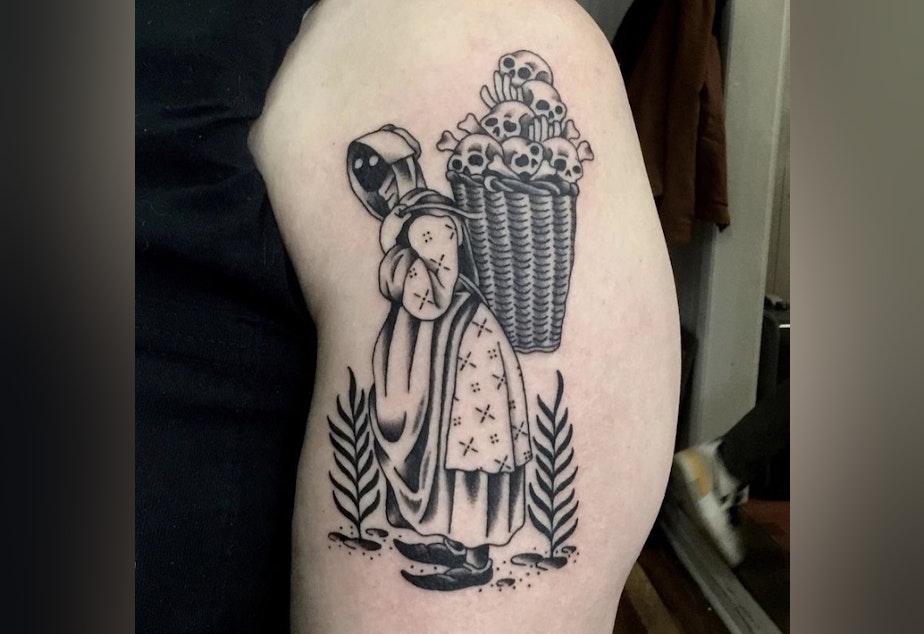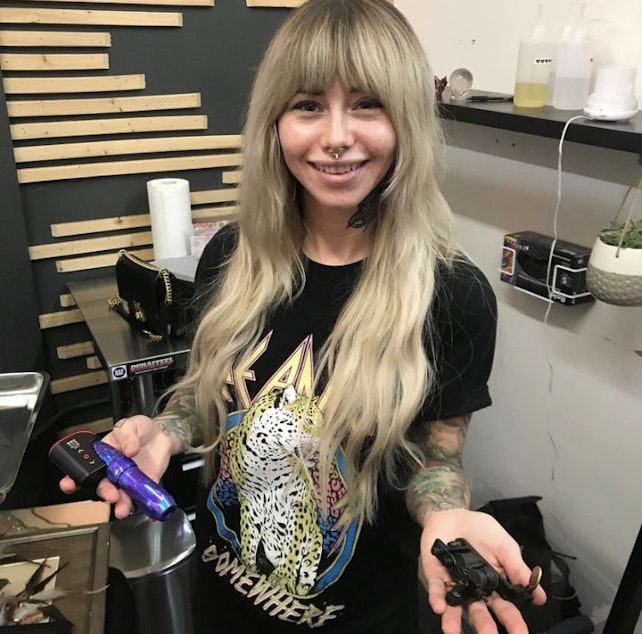Here's how the pandemic inspired a fresh wave of new ink

The pandemic has been brutal, the loss staggering. Family members, neighbors, beloved community members — everyone has a story. Some people are telling theirs with a new tattoo as Covid has spurred a fresh wave of ink.
Nikki Stoops is a Seattle-based tattoo artist who had the opportunity to observe the pandemic through the people that sought out her art.
"I have had a lot of clients come in for tattoos, whether it be good tattoos because of [a] big change that they've realized during the pandemic, but also quite a handful of memorial tattoos due to Covid," Stoops said.
One of the aspects of tattooing Stoops loves the most is the connection she gets to share with her clients. Her customers can come in with an idea, and Stoops turns it into a piece of art that they'll have on their body forever.
"Being able to be the one that got to give that to them was pretty awesome. But also, of course, it was heartbreaking."

Sponsored
Stoops found herself crying with some of her clients. She also lost a loved one to Covid.
She remembers one customer in particular who reached out for a memorial tattoo of his father.
"His father was working on a 1970 Chevy, I believe, just like his whole life, but never quite finished it," Stoops said. "And it was kind of an illustrated version of his dad, chillin in the car with like, Cubs hat on and some palm trees behind him, just like a super beautiful tattoo."
Trauma and tattoos
While the pandemic may have fueled the demand for more tattoos, the artform has been around for at least 5,000 years. Scientists have even found tattoos on Egyptian mummies.
Sponsored
Dr. Deborah Davidson is a tattooed sociologist at York University in Toronto. She says the permanence of a tattoo gives people the opportunity to have a physical reminder of the human experience.
"A 20 year old might get a tattoo related to the pandemic and then 60 years later, be able to share that living history with their grandchildren," Davidson said.
And Davidson says there is a relationship between tattoos and traumatic events, like a pandemic. Survivors of Hurricane Katrina got memorial tattoos of hurricane swirls and the names of loved ones who died; semicolon tattoos have become a popular symbol for awareness and de-stigmatization of suicide and mental health issues.
Brittany and Adelaide
Brittany Rios is a registered nurse at Virginia Mason. Before the start of the pandemic, Rios was working on a general surgery floor. Most of the patients she cared for were recovering from surgeries that were planned in advance, and not urgent.
Sponsored
But as coronavirus cases jumped, Rios found herself becoming a pandemic first responder.
"We changed our entire patient population from you know, the things that I was used to and knew and saw, to wearing masks, getting fit tested for N95s and having to work with that," Rios said.
None of the places Rios normally went felt safe. What if she got sick at the store? What if she got sick at work?
"You know, we took a lot of precautions, and we still have those in place, and they've only gotten better and stronger with time. But it was terrifying. You know, you didn't know what was going to happen," Rios said.
Rios says she didn't intentionally plan on getting a pandemic tattoo. But while scrolling through Instagram, she saw a design from a tattoo artist who had tattooed her before.
Sponsored
It was a woman, dressed like a Puritan settler. She says the image spoke to her.
"She's got like long skirts and a bonnet on and she's carrying a woven basket. And the basket is full of skulls and bones," Rios said. "I saw it and I was like 'this is it.' I call her my Covid death nurse, her name is Adelaide."
Adelaide became a meaningful and therapeutic way for Rios to process the challenges and trauma that came with working as a nurse during the pandemic.
"It's kind of a grounding reminder that I'm still here," Rios said.






